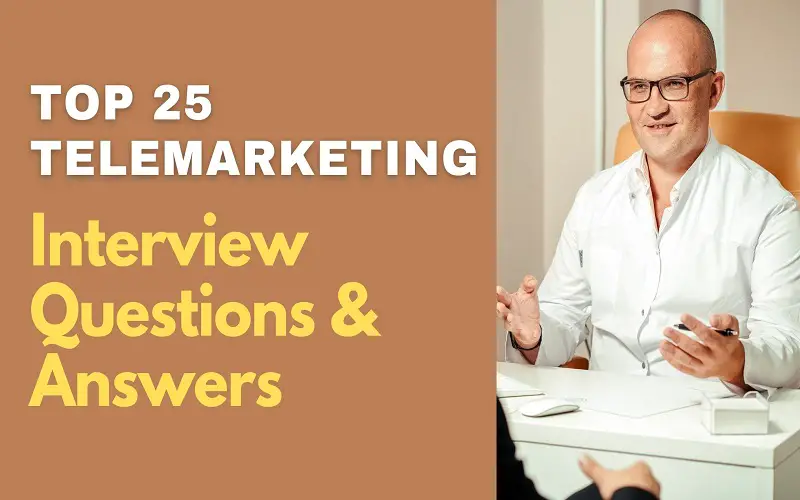As the name suggests, telemarketing is the marketing of products through telephone calls. This article looks at some of the most asked questions in telemarketing interviews to help you land your dream job. Take a look at the following:
1. Why are You Interested in this Job?
I am an experienced marketer with close to a decade of experience in this field. I have worked in call centers and other establishments and believe that I have everything it takes to perform excellently in this job. Also, given that this is one of the biggest marketing agencies in the country, working here will expose me to new challenges, allowing me to better my skill set, abilities, and career. I am ready and willing to put my best foot forward and succeed at this job.
2. Why Telemarketing?
I have always been passionate about marketing, particularly helping businesses or establishments widen their reach and increase sales. I, therefore, knew that this was the best field for me after high school. As for telemarketing, I only decided to pursue it after working shortly in a call center. I found it fulfilling to talk to people and help them sort out their problems. Therefore, when I got a chance to be a full-time telemarketer, I decided to take it, and I am enjoying every bit of it five years later.
3. Mention Some of the Qualities that One Needs to Succeed in this Field
It is worth noting that a telemarketer is a marketer before anything else. Therefore, these individuals must have extensive relevant knowledge about the products they pitch to the customers and excellent communication skills. They should also understand their target audience, including the issues they face. Other qualities include excellent communication and marketing skills, a positive attitude, the right level of confidence, excellent listening skills, and knowledge of dealing with different audiences.
4. Can You Mention a Common Challenge You Face in this Field?
Unlike old-school marketing, telemarketing has its challenges since you don’t talk face to face with the customer. However, one of the most common challenges we face is impatient customers who hang up on us or are usually unnecessarily rude. We don’t get the chance to pitch our products at times. Even though it can affect a telemarketer’s psyche, I have learned to handle such situations well. I keep getting better at this job each passing day.
5. What Do You Like Most about Telemarketing?
I love telemarketing because it is fast and convenient. You don’t have to meet a prospective client to market the products, thus saving lots of time. A telemarketer can also pitch to several prospective buyers in a day. Also, as a person who has worked in a call center before, I find it enjoyable and relatively easy. I know how to give an excellent first impression over the phone and keep the client hooked on the call for the entire marketing session.
6. What Don’t You Like about Telemarketing?
Like any other profession, telemarketing has its flaws, including some that have made me rethink if it is the right field for me. However, it’s biggest disadvantage that I am not fond of is that clients can easily resent it, especially when dealing with business to consumer customers. One must also find the right timing to get across to the customers. I have found that calls made in the evening have low turnover rates and are usually heavily resented. Therefore, a telemarketer must align their timeline with that of the client.
7. Mention a Strategy and Mindset Necessary in Telemarketing
Telemarketing greatly relies on timing and first impressions. Therefore, a telemarketer must capture the prospective client’s attention from the word go when aiming for a sales conversion, which can only be achieved by excellent communication and convincing skills: even the greeting, tonal variation, and intonation matter. As for the right mindset, one must always be positive since approaching a customer with a positive mindset gives you a greater chance of winning them over, unlike with an unsure mindset.
8. Do You Know the Characteristics of Direct Marketing Even Though You are a Telemarketer?
Yes. I know a lot about different types of marketing since I have tried out quite a number. As the name suggests, direct marketing is about direct sales to customers in non-retail settings. One must therefore pre target them and involve no intermediary to succeed. It involves engagement via text messages, email, regular mail, phone calls, flyers, advertisement, coupons, or even social media postings. Therefore, this type of marketing aims to convince a consumer to buy a product on offer immediately or afterward. It has its advantages, such as it allows the personalization of marketing tactics and easier tracking and reporting of campaign success. Direct marketing also offers lots of data to be used in future planning.
9. How Do You Normally Ensure that You Give a Prospective Client a Good First Impression?
As a telemarketer, I heavily understand the importance of first impression as it determines whether the prospective client will continue listening to you or not. I first start by assessing how I greet the customers. I normally offer strong greetings while maintaining excellent intonation to capture the attention of the person on the other end. It has proven successful time and again.
10. Can You Comment on Your Team Working Ability?
I have worked in a number of team settings before and therefore believe that I am a good team worker. I know how to get along well with others, start meaningful conversations and ensure that everyone is working towards achieving the set goals and objectives. Working on a call center at some point in my career also helped improve my teamwork ability since I had to liaise with others to execute my duties. All in all, working in team settings has been humbling and, at the same time, fulfilling.
11. Can You Manipulate Your Voice to Appeal to a Customer?
Yes. I know how to control my voice to create an excellent first impression and keep the prospect glued to the phone during my pitch. I normally keep my voice upbeat as I have learned that it helps pass an engaging and positive attitude to the customer, greatly needed during a sales pitch. I also understand the impact of intonation and diction on a listener and therefore ensure that I keep them clear. Lastly, I am normally wary of my vocabulary, which must be clear and direct to enhance the customer’s understanding.
12. What is B2C?
B2C stands for business to customer telemarketing. It entails the direct sale of products and services to consumers or the end-users of a product or service by the business. Companies that sell directly to customers are therefore normally known as B2C companies. It became widespread in the fall of the 90s, mainly because it was used as a label for online retailers using the internet to sell goods and services to a range of customers. It is also worth noting that this business model is different from B2B, which refers to business to business.
13. Now that You’ve Talked about B2C, Can You Mention the Different Types of Online B2C Business Models in Existence?
Five types of online B2C models help organizations reach their potential consumers. First, the most common direct sellers allow people to source goods from online vendors such as manufacturers or department stores. The second is online intermediaries that act as a link. They don’t normally own the products. We then have advertising-based B2C, which normally relies on free content to attract visitors to a website. Community-based business-to-consumer models also exist. These are online communities that offer sellers a platform to market their products. Lastly, we have fee-based business-to-consumer platforms such as Netflix that allow users to access their content at a fee.
14. Mention One Customer Call You Can’t Forget
I have had a number of excellent, and at times troubling customer calls in my career. However, I can’t forget the one that won us a million-dollar contract and saw the company reward me with a promotion. We were pitching to one of the largest insurance companies in the country, which we believed could benefit from our services. It turned out to be a huge success and our company hugely benefitted. This doubles as one of my most successful calls.
15. Have You Ever Encountered an Angry Client? What Did You Do?
I have had my fair share of angry clients. At one point, I didn’t plan my call well and found this particular client at a bad time. He was so furious that he threatened to block our number. I explained that there had been a mix-up and apologized for finding them at the wrong time. He gave us another day and time where we made our sales pitch. I am glad to report that it was successful.
16. How Do You Handle Unreasonable Requests From Customers?
This profession has taught me to expect anything from customers. Some have even asked me to go against the company and cut a deal benefitting me. I normally turn such requests down and explain that the employer bars me. I pride myself on my integrity and assertiveness. I ensure that I am not proud or unnecessarily rude when turning down their requests since I need to build and maintain an excellent rapport.
17. How Do You Normally Portray a Positive Image to Customers?
There are a number of factors that help me portray a positive image to customers. However, they must start and stop with my voice. I have learned that a good impression revolves around using one’s voice effectively from my time in this field. I also know how to pick my words right when calling a potential candidate. Other factors that I control when making a call are my on-call attitude, body language, vocal tone and quality, rate of speech, and overall tone.
18. Can You Define B2B, B2G, and B2C?
Both B2B, B2G, and B2C have different meetings as they target various people. B2B fully stands for business to business, which refers to transactions between businesses. They are normally huge in volume, which explains their success over time. On the other hand, B2C refers to business to consumer, which are transactions between businesses and customers. These normally happen in retail settings. Lastly, B2G stands for business to government. These are transactions between businesses and governments. It is normal for businesses to supply goods and services to government sectors or firms and get paid.
19. How Do You Normally Build the Trust of a Client?
My time in this field has taught me the importance of building a client’s trust. I, therefore, have a number of techniques that come in handy. I normally speak confidently, an important step that helps customers know that they can depend on you and believe your words. I also stay helpful and friendly to the customers after understanding what they need. Lastly, having extensive knowledge about a product, including the benefits, also comes in handy in winning over a client’s trust. All these go hand in hand with maintaining an excellent first impression.
20. As a Telemarketer, There are a Number of Telephone Protocols that You Should Be Aware of. Can You Mention Them?
Having attended to several clients before, I know quite a number of telephone protocols that one should follow. First, a telemarketer must be quick and responsive when attending to a call to avoid keeping the customer waiting. The customer must also be greeted well at the start of the call for a good first impression. Other protocols include asking for permission before putting a call on hold, ensuring that the customer is satisfied and asking whether they need something else at the end of the call, and obtaining proper authorization from the customer before transferring a call.
21. Do You Know the Disclosures that a Telemarketer Must make During a Call?
A telemarketer must make several important disclosures to a customer before a call. First, a telemarketer must disclose the reasons for making the call at the beginning. It must be in a polite and warm manner. Secondly, they should describe the business or product adequately. Other important disclosures include the product’s price, terms, and conditions, and, lastly, any relevant information about the product that clients should know beforehand.
22. Tell Us about Deceptive Telemarketing. Why Should Organizations Avoid It?
As the name suggests, Deception telemarketing refers to offering misleading information about products to attract customers. All telemarketers should avoid it since it doesn’t uphold integrity or make the necessary disclosures. It can be avoided in a number of ways, such as avoiding wrong and misleading formation about a product, conveying the price at the beginning, selling products at the same rate as other sellers, making all the relevant and necessary disclosures about a product, and maintaining high levels of integrity during marketing.
23. What Would You Do if Your System Crashes Mid-Call?
I have had a number of such happenings in my career. I formally apologize to the customer before asking them to hold for some time as I look into the problem. I then try to resolve it to the best of my knowledge, only requesting help if it is above my ability. If it is destined to take some time, I will offer an apology and request to calm the customer back. I will then note the contacts and get back to them after the system is up.
24. Tell Us about Telemarketing Curfews. Why Is It Important to Observe Them?
Telemarketing curfews are laws that restrict the time when businesses cab call customers for the purposes of telemarketing. In the United States, companies are prohibited from making telemarketing calls before 8 am and after 9 pm. These laws were put in place to protect people’s privacy outside work hours and reduce the resentment of telemarketing. There are very few chances of having a meaningful conversation about a product with a client after 9 pm and before 8 am. It is encouraging that most entities understand that.
25. How Do You Normally Make Telemarketing More Effective?
I use several techniques to ensure that I succeed on my pitches or make the calls effective. First, every call I make is always conducted with a clear objective in mind. I also define and therefore know what I need in a given call. During the call, I ensure that the opening statements are captivating to attract the customers and create a good first impression. I don’t also pass a chance to propose with clear intentions. Lastly, I think about the best responses in anticipation of what the person on the other end may say.
Conclusion
These 25 recommendations are some of the common questions in telemarketing interviews. Make sure that you go through them once more and even come up with unique answers that guarantee success. All the best in your interview!




